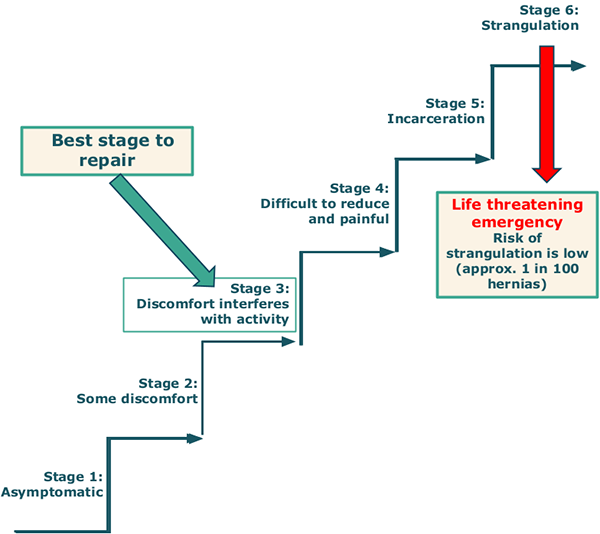Can I Ignore My Hernia Pain?

Hernia symptoms
Hernia symptoms can affect different people in diverse ways. You may know you have a hernia but experience no symptoms at all. It could be just a bit uncomfortable, or you might be living with a notable amount of pain and little visible hernia that impacts your day-to-day life.
At Hernia Clinic Hampshire, we will provide you with guidance about hernia/groin pain, the distinct stages of a hernia and when we recommend having your hernia repaired. We aim to clear up uncertainty about hernia symptoms and bring you peace of mind about your current situation.
If you have groin pain and no visible hernia, we can help diagnose or exclude a hernia as a cause of your pain and offer simple steps to help you try and improve your symptoms.
We are proud to say that every patient who completed a survey last year said that the surgery helped their symptoms and they were happy they had their hernia repaired. We are happy to have been able to help them.
Contact our friendly team today
What If I Have No Hernia Discomfort?
You may be wondering if your hernia will get better by itself. Unfortunately, because hernias are a mechanical problem, like a hole in a wall, they do not repair by themselves.
If left alone, they will eventually develop and become more painful and complicated overtime.
In fact, studies show that 70% of patients with a hernia have no symptoms at first but go on to develop symptoms with hernia pain or discomfort requiring surgery within approximately 18 months. You may not need a repair now, but chances are you will eventually.
We do not recommend repairing asymptomatic hernias but when the time comes to repair it, Hernia Clinic Hampshire will be ready to help.
Book your consultation today
to discuss your options with our consultant surgeon
When To Worry About Hernia Pain?
You might be asking “how long can you wait to have hernia surgery? When to worry about hernia pain?” We recommend repairing your hernia when the discomfort is beginning to limit your usual activities and interfering with your quality of life. For example, you may need to limit your gardening or running around with your kids or grandkids due to worry from your hernia. You may even have had to take time off from work. This is stage 2-3 in the diagram below.
Stage 2-3 (below) is the ideal time to get your hernia repaired so you do not have to change your lifestyle and live with discomfort. Life is too short to spend it in discomfort, unable to do the activities you wish to do, because of a hernia.
At Hernia Clinic Hampshire, we will free you from your symptoms and reactivate your life quickly. We’ll get you back in the garden or back to your job.
Our highly-experienced Consultant Surgeon will help you understand the risks and benefits of a repair, as well as what options best suit your unique situation. Our friendly team will help you book an appointment within one week of contacting us directly and then surgery within 2-3 weeks.
Stages of Hernia
If left untreated for a long time, the hernia will go through these stages and potentially even become an emergency (although rare). Understanding the stages of hernia is important when deciding how long you can wait to have hernia surgery.
Book Online
Call us for full appointment availability

- Asymptomatic
No hernia symptoms at this stage. - Some discomfort
- Discomfort interferes with activity
Best stage to repair.
- Difficult to reduce and painful
This is an early warning sign of an emergency developing. - Incarceration
The hernia will not reduce under any circumstances and is very painful. - Strangulated
Strangulation means blood flow to the hernia contents has been cut off, which is often part of the intestine. This is a serious medical issue.
Managing Hernia Symptoms Before Surgery
If you are not ready for hernia surgery, we want to help you prevent your hernia symptoms from holding you back. Our patient-recommended Hernia Recovery Programme has been specially designed to help you manage hernia symptoms when used pre-surgery. This includes:
Hernia Supports
These high-quality, medically-approved hernia support garments help to keep your hernia reduced and support your abdominal muscles while you go about your day-to-day activities.
They come as either hernia pants/briefs for groin hernias or belts/wraps for ventral/abdominal wall hernias.
Hernia Rehabilitation Exercises
These specially-designed exercises help you strengthen the abdominal wall muscles around your hernia. We recommend you perform these while wearing your hernia pants/belt for added support and comfort.
Read more about our Hernia Recovery Programme
Visit the shop today.
Weight Loss Support
Carrying excess weight can worsen hernia symptoms and delay safe treatment. If your current weight may affect your suitability for surgery, we can refer you to a private GP service running a Weight Loss Support Programme.
